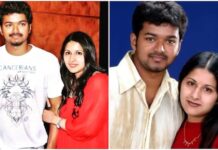T-Series Films’ All Is Well is a family drama. Inder Bhalla (Abhishek Bachchan) has had a traumatic childhood because of the constant fights between his parents (Rishi Kapoor and Supriya Pathak). His father wants to continue running his bakery but his mother wants it shut down because it fetches no profit. Inder grows up hating his father and since he is interested in music, he doesn’t want to join his father’s business.
One day, an argument between Inder and his father leads to the father asking Inder to get out of the house. Inder goes to Bangkok and several years later, he is still struggling to make his mark as a singer and music director. He has fallen in love with Nimmi (Asin) who is keen to marry him. Blame it on the bad marriage of his parents, Inder does not believe in the institution of marriage and so is prepared to sacrifice his love. Nimmi’s parents have fixed her marriage with Mohit (Harry Tangri). But Nimmi loves Inder so much that she is still trying to get him to marry her. Nimmi believes in fate and is convinced that destiny has been giving them enough indications that Inder and she are made for each other.
One day, Inder is called to India by one Cheema (Mohammed Zeeshan Ayub) on the pretext of signing the papers of his father’s bakery which is up for sale. He travels to India on the same flight as Nimmi who is visiting India for her marriage with Mohit. On arriving in India, Inder realises that Cheema is forcing his father to transfer the bakery in his name as he (father) had borrowed a lot of money from him and is now unable to repay the loan. But Inder’s father will not sign the bakery papers despite Cheema threatening to kill him.
Once in India, Inder learns that his mother, suffering from Alzheimer’s disease, is now staying in an ashram. Of course, he brings her home forthwith. As time passes by, he also learns that his father and mother had been divorced. Inder’s father also tells him that his mother had kept the gold jewellery with her brother, Kirpal (Mukund Bhatt), for safety. If they can get the jewellery back from him, the same can be used to clear Cheema’s loan, and the bakery then would not have to be transferred. But Inder’s maternal uncle, Kirpal, dies before returning his sister’s jewellery to the Bhallas. The cunning widowed maternal aunt (Seema Pahwa) is in the mood to usurp the Bhallas’ jewellery.
Anyway, Inder and his parents are on the run from Cheema who is baying for their blood. Saddled with them is Nimmi who considers this also as a sign that she and Inder are destined to unite in matrimony. Fate also brings Inder and his parents to Nimmi’s house and Inder even ends up dancing at Nimmi’s sangeet ceremony. Inder and his parents escape from Nimmi’s house when Cheema reaches there in search of them. Cheema’s men also take Nimmi alongwith them as they decide to chase Inder once again.
By quirk of fate, Nimmi once again unites with Inder and his family after some time. She is unable to reach home even as the time for her wedding is approaching and her to-be husband, Mohit, has reached for the marriage.
What happens thereafter? Does Nimmi make it to her own wedding? Does she marry Mohit? Or does fate intervene and bring Inder and Nimmi together as life partners? Do the Bhallas get back their jewellery? Do Inder and his father start seeing eye to eye? Do they see each other’s view point? Does the condition of Inder’s mother improve? Do the Bhallas have to transfer the bakery in Cheema’s name?
Umesh Shukla has penned a story which is very implausible. If the entire film was designed as a comedy, the implausibility factor may not have been the problem it turns out to be because alongside the comedy, the film is also a family drama where the emotions are real. Umesh Shukla and screenplay writers Sumit Arora and Niren Bhatt have not been able to keep the comedy track different from the track of the family drama. Consequently, the audience simply fails to feel the pain of the characters in the Bhalla family. In a similar fashion, Nimmi’s romantic track is written so superficially that her keenness to marry Inder loses the seriousness associated with it. The audiences are not able to decide whether they should be laughing at Nimmi’s desperation or sympathising with her.
The screenplay seems to have been written with a view to offering the viewers everything under the sun. As a result, much of the drama looks too contrived. The angle of Inder’s mother suffering from Alzheimer’s disease; the tension between Inder’s father and mother; the tension between Inder and his father; the lack of commitment to Nimmi by Inder – all of these tracks completely fail to have the desired effect on the audience because there’s no build-up of these tracks, they just pop up when required to further the drama. The bladder problem of Inder’s father is another such irritating track which creates no comedy. Likewise, there is no comedy in the scenes of Nimmi’s family members. Just showing all the members of the extended family having the same kind of frame for their spectacles is not comedy and it definitely doesn’t evoke laughter! There is no consistency in the screenplay too. For instance, Inder is thrown out of his house by his father but, years later, the father blames Inder for having deserted him! Nimmi’s parents and huge extended family are shown to be idiots who are hardly bothered about Nimmi missing from her own wedding till almost the eleventh hour. All Nimmi’s father does is to telephone her at irregular intervals and request her to come home as if that’s the maximum the father of a missing to-be bride can do and should do.
Perhaps, the only tracks which entertain the audience are those of Cheema with his goons, and of Inder’s scheming aunt. That’s because they are pure comedy tracks with no element of seriousness or sentiments whatsoever. Otherwise, the film looks like a hotch-potch drama which fails to leave the viewer rooting for anybody in particular.
Sumit Arora and Niren Bhatt’s comic dialogues are good at places but often fall flat because the situations are so silly.
Abhishek Bachchan has limited expressions on his face to convey his feelings. He plays Inder quite superficially. Asin seems to be disinterested in her work and gives the impression of rushing through her role. Rishi Kapoor is ordinary because he has a poorly-written character. Supriya Pathak moans more than she acts and that gets irritating for the viewers. Mohammed Zeeshan Ayub is excellent as Cheema. Seema Pahwa is brilliant. Sonakshi Sinha adds star value in a special appearance in a dance number. Jameel Khan, Tiku Talsania, Harry Tangri, Mukund Bhatt (as Inder’s maternal uncle), Gurpal Singh (as Nimmi’s father), Seema Pandey (as Nimmi’s mother), Sumeet Vyas (as Ronnie), Nilesh Bhatt, Wilson Tiger, Anand Kumar and Altaf (all four as Cheema’s goons), Kenny Desai (as minister), master Siidha Daga (as young Inder) and the rest lend fair support.
Umesh Shukla’s direction, limited as it is by the script, doesn’t do much to keep the audience’s interest alive. He is unable to handle the comic and dramatic tracks effectively enough for the audience to enjoy the light moments while feeling for the characters in the dramatic ones. The pace of his narration is also slow. Music (Himesh Reshammiya, Meet Bros. Anjjan, Amaal Malik and Mithoon) is appealing. A couple of songs have melody and a couple of them are fast-paced. Lyrics (Shabbir Ahmed, Kumaar, Amitabh Verma and Mayur Puri) are good. Ahmed Khan and Remo D’Souza’s choreography is fair. Sanjoy Chowdhury’s background music is ordinary. Sameer Arya’s camerawork is nice. Kaushal Moses’ action scenes are functional. Muneesh Sappel’s production designing is fair. Sanjay Sankla’s editing leaves something to be desired.
On the whole, all is clearly not well with All Is Well. With little to offer, it will fail to make its mark at the box-office. If it still manages to control the losses of the persons associated with it, it will be due to the handsome price it has fetched for the satellite rights (pre-sold).




























